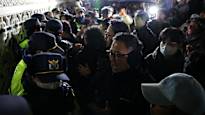President of South Korea Yoon Suk-yeol unexpectedly declared a state of emergency on Tuesday and caused chaos.
After that, the Commander-in-Chief of the country’s army Park An-soo announced that it would ban the functioning of the parliament as well as strikes and demonstrations.
In addition, Park said the military will take control of South Korea’s media.
Tuesday’s events left the Korea researcher almost speechless.
– This is a very bad day for South Korean democracy, says the lecturer of East Asian studies at the University of Turku Sabine Burghart.
Burghart says that several of his colleagues have been warning about the weakening of South Korean democracy for a long time, and he has partially agreed with that.
Still, Tuesday’s events came as a surprise to him.
– I have been surprised and shocked by this, says Burghart.
Another Korean researcher from the University of Turku is on the same lines.
– Excesses of a similar scale have not been seen during democracy from any politician, let alone the president, says the doctoral researcher of the authoritarian history of South Korea Katri Kauhanen.
During the authoritarian period that continued until the 1980s, exceptional laws were common in the country, but since then they have not been enacted, Kauhanen points out.
Parliament and the president face to face
Parliamentarians managed to gather in South Korea’s parliament and vote to end the state of emergency, despite attempts by the police to stop them.
According to South Korean law, the country’s government must cancel the emergency law if the majority of the country’s parliament representatives demand it.
However, according to Burghart, the situation was complicated, as the army had time to ban political activity before the vote under the state of emergency.
– So at the moment there is no clarity on the matter.
The army already had time to announce that it is not going to end the state of emergency until the president waives it.
Later, however, the president announced that he would cancel the emergency law at the request of the parliament.
Ever since South Korea became a democracy in 1987, conditions for declaring emergency laws have been laid down in the country’s constitution.
President Yoon has pleaded that there is a state of emergency in the country due to the threat from North Korea.
According to Burghart, the argument is very problematic.
Kauhanen points out that during the authoritarian period, the military administration used exactly the same grounds, i.e. North Korea and national security, to declare emergency laws.
However, the researcher emphasizes that South Korea has changed enormously as a society. The fact that society has not accepted the president’s actions shows that.
– This has clearly put the South Koreans on the back foot, that our democracy cannot be touched in this way.
In the background, difficulties with the opposition
President Yoon’s reign, which began in 2022, has been marked by difficulties with the opposition.
South Korea has a two-party system, and the liberal opposition party has had a majority in parliament since the spring, making it difficult for Yoon to govern.
The opposition has blocked several of the president’s legislative initiatives. Most recently, it ran through the state budget, which was significantly smaller than the government’s proposal, in the finance committee.
The opposition has also been visibly calling for the removal of the unpopular president in recent months.
All in all, political decision-making in South Korea has been in a bad knot, says Burkhart.
The researcher reminds that Yoon’s background is not in politics. Therefore, making political compromises has been challenging for the president representing the conservative party, and cooperation with the opposition has not been successful.
– Yoon’s leadership style has been criticized. Some say that he runs the country like a prosecutor and that he also treats, for example, his political opponents like a prosecutor, says Burkhart.
It is unclear what Yoon was trying to achieve with his exception law.
Burghart believes the president may have resorted to the last resort because he felt he had reached a political impasse.
Democracy lasted
While the situation is still alive, it is not yet known what will follow from this. Protesters have already called for Yoon’s arrest. Burkhart believes that the protests will intensify.
The ally, the United States, also expressed concern about the situation. The weight of the United States is great in South Korea, as there are approximately 30,000 US soldiers in the country.
Kauhanen believes that difficult times are coming for President Yoon.
– He will be attacked next, and efforts will be made to get him out of office.
According to the researcher, however, the positive thing about Tuesday’s events was that democracy seems to have come out victorious, as the president finally bowed to the will of the parliament.
This is how President Yoon declared the state of emergency:
The story was completed on December 3, 2024 at 10:26 p.m. Added Kauhanen’s comments and the information that the president is canceling the exception law.
